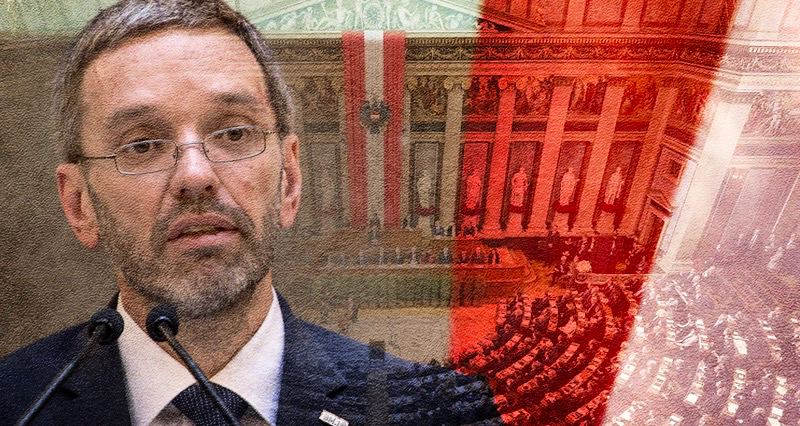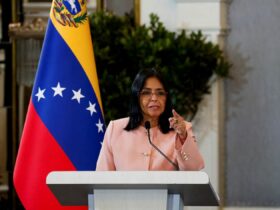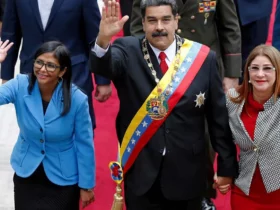Other topics in the coalition negotiations are immigration, deindustrialization, budget, and relations with the EU, experts say in interview.
Other topics in the coalition negotiations are immigration, deindustrialization, budget, and relations with the EU, experts say in interview.
The plan to exclude the Freedom Party of Austria (FPÖ), the winner in the elections, from the government has backfired. The mandate to form the government has now been given to the FPÖ.
Following this development, Türkiye’s daily Aydınlık newspaper’s supplement in Europe, Aydınlık Europe, conducted interviews with Austrian historian Christoph H. Benedikter, Freilich magazine’s Editor-in-Chief Stefan Juritz and Turkish historian and political scientist Mehmet Perinçek.
Christoph H. Benedikter: FPÖ and ÖVP represent 55% of the votes, will try to establish governing coalition
Previously, despite the FPÖ being the leading party, the goal was to establish a coalition that excludes it. Now, the FPÖ is forming the government. How do you interpret this?
Some may suggest that democracy is dying in Austria, but the opposite is true. Only a government formed by the two strongest parties, the Freedom Party of Austria (FPÖ) and the Austrian People’s Party (ÖVP) can be deemed “normal”. After all, 55% of Austrians voted for this. The people’s demand is so clear: Rescuing the Austrian industry, preserving high-quality jobs, ending uncontrolled mass immigration where asylum rights are being abused, improving internal security, refraining from further expansion of an already extensive welfare state and introducing savings and spending cuts instead of new taxes.
“FPÖ received votes especially from immigrants”
The portrayal of FPÖ and ÖVP’s goals as right-wing or far-right in much of the media stems from one fundamental reason: In Austria and much of Europe, over 70% of journalists and media professionals are aligned with the Greens and Socialists, particularly in state televisions. This “far-right FPÖ” narrative is to obscure certain realities, for example the fact that so-called anti-immigrant FPÖ received significant vote rate from voters of immigrant origin in Vienna. Among Austrian citizens of Turkish descent living in Vienna, roughly 70% voted for the FPÖ. The percentage is even higher among people of Croatian and Serbian origin.
Differences between FPÖ and ÖVP
How will Austria’s domestic and foreign policies change? Do you expect this to impact the EU’s policies?
In domestic policy, FPÖ and ÖVP generally agree on principles regarding the economy, immigration and social policy. They believe in reducing the burden on businesses, cutting back bureaucracy and increasing pensions and keeping social spending below the inflation rate. ÖVP advocates for more decisive measures, while FPÖ as representing more workers, will likely take a more cautious approach to social cuts. And ÖVP will have more cautious in curbing mass migration since it feels more bound by EU rules. In terms of social policy, both FPÖ and ÖVP reject destructive trends such as gender ideology, the queer movement and the idea of freely choosing one’s gender identity. Both parties advocate for the protection and promotion of families.
FPÖ wants national sovereignty
The differences are more pronounced in European policy: FPÖ supports preserving nation-states and opposes EU integration. It envisions a Europe of independent countries rather than a “United States of Europe”. Meanwhile, ÖVP has a less critical stance toward EU institutions and integration policies.
Austria could be a model
The Union’s overall policies would not shift significantly due to the changes in Austria. Austria lacks the weight to force or initiate a directional shift in Europe. However, in the medium term, developments in Austria could serve as a model for voters in Germany or France. In these two big countries, the majority is likely to vote for conservative and right-conservative parties, but governments will still be formed with the participation of the left. Austria clearly demonstrates that this doesn’t have to be the case. Should there be a conservative turn in Europe, self-harming policies like the European Green Deal and open border might be ended.
“Deindustrialization must be stopped”
Looking ahead, which policies do you think will garner public support for the parties in Austria and Germany?
In the upcoming elections in Germany and Austria (assuming FPÖ and ÖVP cannot agree this time), the parties that will succeed are those that credibly advocate for the following goals: Maintaining prosperity, halting deindustrialization, reducing energy costs, eliminating bureaucratic red tape that hinders entrepreneurship, stopping mass migration and restructuring the welfare state in a way that only those in need receive support.
Social issues will also play a significant role. The majority rejects experiments like fully legalizing cannabis and the extremes of the queer and woke movements. For Germany, this means parties like CDU, CSU and AfD would get the majority of votes.
Stefan Juritz: FPÖ will address budget deficit
Despite FPÖ winning the elections, a coalition without FPÖ was being initially considered, but later FPÖ was tasked with forming the government. What led to this development?
Coalition negotiations between the Austrian People’s Party (ÖVP), the Social Democratic Party of Austria (SPÖ) and the New Austria and Liberal Forum (NEOS) ended in failure. The parties couldn’t agree on a joint program. First, NEOS withdrew from the negotiations, and later ÖVP and SPÖ announced they were ending talks too. During this process, Chancellor Karl Nehammer also announced his resignation. Before the elections, Nehammer had stated that he didn’t want to form a government with FPÖ leader Herbert Kickl. However, following Nehammer’s resignation, the door opened for a coalition between FPÖ and ÖVP. President Alexander van der Bellen, who had initially refused to task FPÖ with forming the government after the elections, stepped back.
Since the last election, FPÖ has continued to increase its support in polls. Most Austrians struggled to understand the political maneuvering that was clearly aimed at keeping FPÖ out of government. The proposed coalition of ÖVP, SPÖ, and NEOS was essentially seen as an “Anti-Kickl Coalition” with no greater purpose.
Now, FPÖ finds itself in a much stronger position in coalition talks with ÖVP. FPÖ could even go to early elections if necessary. Many observers believe that under the current conditions, FPÖ might achieve an even better result in such a scenario.
Savings first
With Kickl likely to become Chancellor, what can Austria expect from an FPÖ-ÖVP government?
First of all, it’s important to note that Austria is currently facing significant financial challenges. The budget is in much worse shape than expected, a fact that was only revealed to the public after the Federal Council elections. Whether the government deliberately withheld this information to avoid a worse election outcome is a question to investigate.
FPÖ will have to address the enormous budget deficit of billions of euros, that’s to say prioritize savings. Since both parties oppose to introduce new taxes, cuts of several billion euros will be needed in the budget.
Mehmet Perinçek: Rising idea is a Europe for Europe
What is the formation of a government led by FPÖ in Austria telling us?
The recent elections in Austria reflect the broader trends in Europe. There is now a confrontation between those advocating for “Europe for Europe” and “Europe for the US”, or between anti-war parties and pro-war parties.
There isn’t a single European country that hasn’t been hit by the Ukraine war. Economic and energy crises, political instability, and concerns about the risk of Europe entering a war are problems that most countries are grappling with.
Besides the Ukraine issue, there’s also a social policy aspect of this confrontation such as defending the family and protecting producers against neoliberal economic policies.
No other option left
The rise of nationalist parties compels other parties to make concessions on issues such as Ukraine, green transformation and trade with Russia?
Europe has no other option left. Germany is now said to be the “sick man” of Europe. Yet, Germany was once a driving force not only in Europe but in the global economy and industry. Now, it’s in a production crisis.
That’s why, one way or another, the idea of “Europe for Europe” is on rise everywhere. AfD has been advocating this program from the very beginning. Those who don’t adhere to this program, even though just for “show”, can’t be successful. The results of the election polls show this. With Trump’s presidency, this program will impose itself even more. If Trump also starts to withdraw from Ukraine, the burden on Europe will increase. Additionally, Europe will face tough times in trade with the US. This will force altering the current policies on issues such as trade with Russia. Also, Russia’s successes on the battlefield and at the negotiation table, along with the initiatives by Trump and Putin, will leave Europe on the sidelines. All these factors bring the program I mentioned to the forefront.
Not temporary, but systemic
We see the rise of parties similar to FPÖ in other countries. Does this give us an idea about Europe’s future or do you think it’s a temporary trend caused by war and economic difficulties?
This is not temporary because the problem is systemic. It’s not only caused by war. The war, of course, deepened this systemic problem.
In the overall picture, this is the bankruptcy of Europe’s dependency policies on the US. This process is a result of the system that American imperialism dragged the world into. The COVID-19 pandemic also showed this. During the pandemic everyone saw that neoliberalism failed in the economy, society and politics. Again, here the main cause there wasn’t the pandemic, but the crisis of the system.
All this signals that there is something “new” in Europe, that the crisis created by American imperialism has pushed Europe into a new phase. This is not something temporary, but systemic.
















Leave a Reply